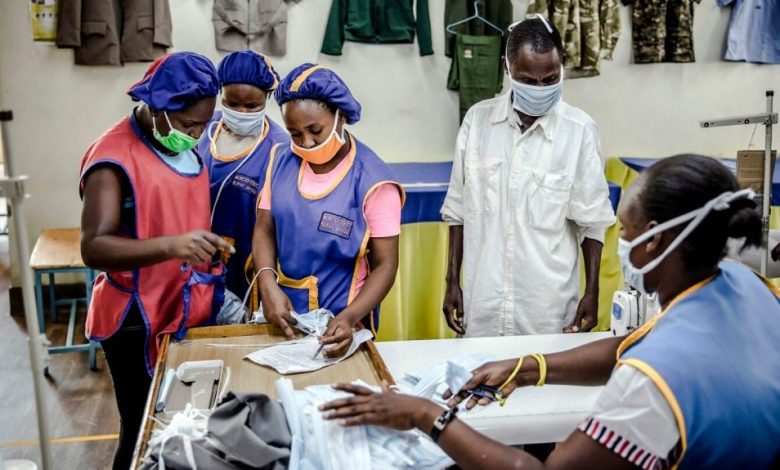COVID-19: NGOs, Businesses, Step In To Address Shortage Of Face Masks

Following shortages in the supply of face masks to check the spread of COVID-19, Non-governmental organisations (NGOs) and businesses have stepped in to fill the gaps and make the commodity available for public use.
While the NGOs are involved in philanthropy, business people, such as tailors, are taking advantage to earn income.
The Presidential Task Force on COVID-19 had given the wearing of face masks in public as one of the safety measures against the spread of the virus.
Chinwe Onyeukwu, Executive Director of Women Africa, said getting masks to demographics who have increased contact due to economic reasons was crucial.
Women Africa has collaborated with African Masks, a humanitarian initiative distributing masks to those who cannot afford them on the continent.
The group distributed masks to women in Dutse Sokale and Dutse Makaranta, which are underserved communities in Bwari Area Council of the Federal Capital Territory.
Although the government has promised to provide masks for those in need, a partnership with another NGO will allow masks to reach communities faster, Onyeukwu said.
“There’s no clear indication of how Nigeria will be able to provide for people who may not be able to access masks either in terms of finance or of availability with these masks.
“It is for this reason that civil society organisations like Women Africa are working to bridge the social welfare gaps by providing free masks for vulnerable women and children in informal settlements,” she said.
Onyeukwu pointed out that some state governments had given masks to people.
“Abia State and Cross River State have also taken initiatives. Lagos State is going to give one million masks for 20 million people. But only one million for 20 million people?” That’s not a lot.
“That’s the issue. I’ve seen other organisations, especially those helping people with disabilities get masks to people. Those who may really need masks need to get them,” she said.
Onyeukwu noted that awareness campaigns educating Nigerians about the need for facial masks might encourage people to adopt the prescribed safety measure.
Emilie Serralta, the Human Rights organiser of African Masks, said the organisation raised over 3,000 euros to fund the project.
She said the organisation collaborated with local tailors to produce 1,000 masks for the Coalition for Grassroots Human Rights Defenders, a human rights group working with a local community in Mathare, an informal settlement in Kenya’s capital, Nairobi.
Serralta said she wanted to collaborate with stakeholders in the human rights community to create preventative measures to support governments in addressing public hygiene and sanitation challenges in Africa.
“I have a lot of friends in both Anglophone and Francophone countries and I could ask them questions.
“The human rights community is a tight community and very connected with a quick flow of information. The mask is a tool that can be used to help.
“Since there is a tailoring culture, which isn’t so much in Europe, a free reusable cloth mask can help bus drivers, market women, police—the most vulnerable communities,” she said.
The project has exceeded its production target in Kenya, Serralta said, adding that since early April the organisation had distributed a total of 1,600 masks to Senegal through Amnesty International.
On April 17, 250 masks were distributed to market sellers. Communities in Goma, North Kivu, in the Democratic Republic of Congo, have also asked for 5,000 masks, she said.
African Masks has also expanded its production to Benin, Ivory Coast and Nigeria, she added.
Meanwhile, some tailors in Nigeria are earning income through the production of face masks.
Susan Duruji, an Abuja-based tailor, told HumAngle that she began making face masks for those who could not afford medical masks and wanted cheaper options.
“I started making masks because the government mandates we wear them and I saw people needing a better financial option and needing to get masks quickly.
“My customers come from different financial backgrounds. Those who wanted to keep safe could only afford reusable masks that I sell for N500.
“And some customers couldn’t even afford that because they needed the money for food. Times have been tough for many,” she said.
Olusola Babatunde, a Nigerian fashion designer and Managing Director of Onestop Celebration Limited, said his outfit had produced over 300,000 masks.
“I felt strongly that I could do something to contribute my own little quota to curbing the spread of the COVID-19 virus in the country,” she said.
The business community has also been helping out through philanthropy.
On Tuesday, May 5, Jumia, a popular e-commerce platform, donated 100,000 CE rated facial masks to the Federal Ministry of Health. Abdulsamad Rabiu, through the BUA Foundation, donated up to 100,000 facial masks across nine states.
Mass shortages of medical supplies to treat cases have led health experts and medical organisations to declare Africa as a potential hot zone for an outbreak that will be difficult to contain.
On April 7, Dr Matshidiso Moeti, World Health Organisation Regional Director for Africa, said, “COVID-19 has the potential not only to cause thousands of deaths, but to also unleash economic and social devastation.”
Support Our Journalism
There are millions of ordinary people affected by conflict in Africa whose stories are missing in the mainstream media. HumAngle is determined to tell those challenging and under-reported stories, hoping that the people impacted by these conflicts will find the safety and security they deserve.
To ensure that we continue to provide public service coverage, we have a small favour to ask you. We want you to be part of our journalistic endeavour by contributing a token to us.
Your donation will further promote a robust, free, and independent media.
Donate HereStay Closer To The Stories That Matter




